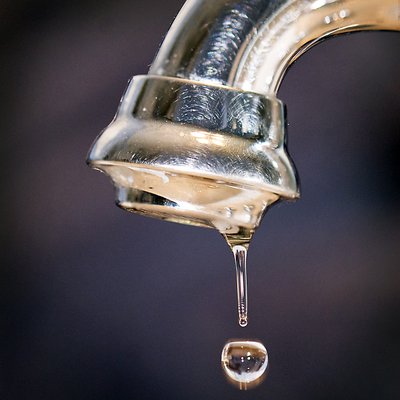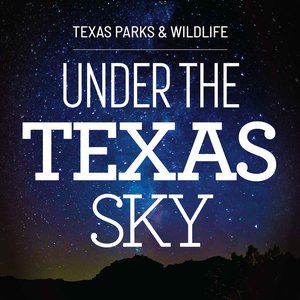Water Conservation

On the podcast we talk with Melissa Alderson who is the Conservation Education Manager at Texas Parks and Wildlife. We’ll learn why she's so passionate about water, and she'll also share with us common sense tips on saving water and why it's so important – and not just for our future, but also for the future of wildlife.
Water Conservation
Season 3 Episode 15


Under the Texas Sky: S3E14: WATER CONSERVATION
[MUS—LOTUS FLOWER]
[SFX—BABBLING BROOK]
Texas boasts an abundance of lakes, rivers and streams, as surface water and as underground aquifers.
[SFX—RAIN WITH THUNDER]
And when it rains... it seems that the availability of water is unending. But things aren't always as they seem. As our population continues to grow, so should our concern for the availability of fresh water.
[SFX—OCEAN]
Of all the water found on earth, ninety-seven percent of it is saltwater. If you're doing the math that means just three percent of all water is fresh water. But here's the thing, eighty percent of that water is frozen in the Polar Ice Caps and unavailable for our use; so what we're left with, then, is just one half of one percent for our use. And let's not forget that we have to share that tiny amount of fresh water with nearly eight billion human beings and nearly nine million animal species – how many individual creatures that actually represents is anyone's guess.
[SFX—CREEK BIRD]
I know you get it; you understand that water is our most precious natural resource. You probably also know, then, that the demand on our water supply grows every day as the population of Texas quickly approaches 30 million people. That number is expected to reach 54 million by the year 2050. Freaking out is optional, but the time is now for all Texans to do their part in conserving water.
[SFX—FAUCET SHUT OFF]
On the podcast we'll speak with Melissa [Mah-liss-ah] Alderson [All-der-sun] who is the Conservation Education Manager at Texas Parks and Wildlife. We’ll learn why she's so passionate about water, and she'll also share with us common sense tips on saving water and why it's so important – and not just for our future, but also for the future of wildlife. Stay with us.
[MUS—HOWDY]
From Texas Parks and Wildlife…this is Under the Texas Sky …a podcast about nature…and people… and the connection they share…I’m Cecilia Nasti.
[MELISSA] Water is connected. No matter where you live here in the United States. Seeing on how important water is, that's the natural resource of life. Everybody needs water.
Educating others about water is one of Melissa Alderson's top priorities.
She's the Conservation Education Manager at Texas Parks and Wildlife. But her own education about water began in her youth. Originally from Schaumburg, Illinois, a suburb of Chicago, her family spent their summer vacations at one of the largest lakes in the world.
[MELISSA] I grew up just outside of Lake Michigan, so being from the Great Lakes region. My grandpa is a huge outdoorsman, and he brought us camping every summer. And we went up to a campsite in Michigan and the fondest memories of swimming and getting a leech stuck on my foot and having my mom rip that off. It was fabulous. But then one the biggest memories my family still talks about is, my grandpa and I, we, we were fishing with cane poles, and just looking for little sunfish and all of a sudden I got this big Sunfish on the line and by-golly, it snaps my grandpa's cane pole, and I swear it was the size of a dinner plate. It was the biggest Sunfish ever, and so being on the water, I've enjoyed it ever since I was a little kid.
Melissa was only 6 years old at the time, and she thought her grandpa would be upset with her for breaking his cane pole. Contrary to her expectation, he was very happy with her catch. You might think that such an impression would have immediately defined a path that would lead to aquatic science. Instead she became a pediatric nurse, but her love for nature could not be ignored.
[MELISSA] I went to work loving my job, but just looking at all the nature, and I said just something, I'm on the wrong path. So, I went back to school and I got my biology degree, and I went from being a nurse to running summer camps. And I just felt that that's the place that I should be- I should be outdoors, educating people.
[MUS—EXPLORE YOUR WORLD]
And so, began Melissa's conservation journey. She began working at a wildlife rehabilitation center and was a raptor handler for 17 years. She also spent more time educating the public about aquatic habitats and the need to protect water for wildlife.
Today Melissa is champion-ing that cause for the State of Texas. She manages several public outreach and educational programs designed to drive home the importance of water conservation.
[MELISSA] When we're in a drought a lot of people think of water conservation practices. But when our aquifers are full, our lakes are full, people don't think of ways to conserve water. And conserving water needs to be done in everyday life. That means when you're brushing your teeth, turning the water off. When you're taking a shower, some people turn off the shower when they're washing their hair. For washing dishes, making sure that the dishwasher is full instead of just washing, putting the washer on when there's only two plates in there, let's have a full dishwasher. And those are the kinds of things that people can do in their everyday life to help conserve water for wildlife and for other Texans and future generations.
[SFX—WATER BREAK]
Creating awareness of the need to conserve water comes in all forms and Melissa uses all of the resources in her toolbox, including several award-winning video documentaries produced by the Texas Parks and Wildlife Media Productions Branch.
[MELISSA] We have the Texas, State of Water video collection. So anybody can go to the website: texasthestateofwater.org and view the videos and look for conservation practices. The other resources that we have, we have the Texas Aquatic Science, which is a middle school, high school curriculum. And that is implemented into over 200 schools throughout Texas, and then we also have the Texas Waters. It's a watershed curriculum, and that curriculum educates concerned citizens to help protect the natural resource of water here in Texas.
The Texas Waters program will allow both citizens and Texas Master Naturalists the opportunity to earn a Texas Waters Specialist designation, and then start giving back to their community by performing volunteer-service.
But how does Melissa know programs like this work?
[MELISSA] The way that we know that they're working, is because we are training on a yearly basis at least a hundred new Texas Water Specialists every single year. And so those concerned citizens are going into the natural habitats and they are restoring the lakes to be healthier. They are going in and dredging out karsts, which are caves underwater to help the water drain into the aquifers better. They are doing restoration on the riparian habitats which provides really good breeding grounds for fish in the waterways.
[SFX—FISH HABITAT]
[MELISSA] I feel that we are part of the ecosystem and if we ignore our practices and our behaviors, we have less water. We're going to have more polluted waters, and we're not going to have waters for us to even enjoy for recreation. Part of what recreation is, people being able to fish. When you have healthier waters, you have healthier fish, a greater diversity of fish. And some people utilize that water to feed their family as well. And so, we are all together part of the ecosystem.
[MUS—LUMINATING]
As our cities get larger and open spaces get smaller, the impact of less water for fish and wildlife is being felt statewide. But there's one habitat that Melissa says is vital to the aquatic ecosystem.
[MELISSA] We're building more homes and we're encroaching on a lot of different habitats, but one important habitat is wetlands. So wetlands are a filter for our waters, so if we get rid of wetlands, all that dirty runoff water is going straight into the creeks, the waterways and the drainage systems. So what people can do is, they can go out, they can restore wetlands, include more wetland features in broad landscapes. They can plant natives; they can have their rain gardens. The wetlands are an incredible piece here in Texas, there are the Playas that are in the High Plains, they are the swamps out East. And then the one that connects everybody is rivers, creeks and streams. Riparian zones and all of those waterways are considered a wetland.
[MUS—TRUEST HEART]
[MELISSA] The nuts and bolts of individual watershed and ecosystems is to show how they all tie together, including human behavior. And what we want people to do is, we want them to appreciate and love the outdoors, and create a willingness to protect and conserve that water here for us and for the wildlife.
Thanks Melissa.
What will you do to help conserve water? Will you create a xeriscape as part of your home landscape design? Will you become a Texas Waters Specialist? Or will you simply keep the water off while you brush your teeth? No matter how you choose to conserve water, know that you're making a difference for fellow Texans and Texas wildlife.
[MUS—TO ORBIT YOUR SOUL]
And so, we come to the end of another podcast. Under the Texas Sky is a production of Texas Parks and Wildlife and is available at UndertheTexasSky.org or wherever you get your podcasts.
We record the podcast at The Block House in Austin, Texas. Joel Block does our sound design.
Susan Griswold and Benjamin Kailing provide distribution and web help. Whitney Bishop does our social media.
Randall Maxwell produced today’s podcast. I’m Cecilia Nasti, reminding you that life’s better outside when you’re Under the Texas Sky.
[MELISSA] Water is the natural resource of life. Everybody needs water.
Join us again next time for Under the Texas Sky.

